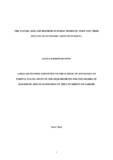| dc.contributor.author | Kittony, Justus K | |
| dc.date.accessioned | 2014-08-04T07:52:01Z | |
| dc.date.available | 2014-08-04T07:52:01Z | |
| dc.date.issued | 2014-05 | |
| dc.identifier.citation | Master Of Arts In Economics Of The University Of Nairobi,2014 | en_US |
| dc.identifier.uri | http://hdl.handle.net/11295/73539 | |
| dc.description | A Research Paper Submitted To The School Of Economics In Partial Fulfillment Of The Requirements For The Degree Of Master Of Arts In Economics | en_US |
| dc.description.abstract | Public Domestic Debt has remained one of the sources of government finances for most economies. This phenomenon has greatly impacted on developing countries, where most of them find themselves locked in a public debt burden, leading to adverse effects on economic growth. The main objective of the study was to investigate the nature, size and reforms in domestic debt and its effects on economic growth. This study used time series data from the period 1970 to 2012 to critically investigate the relationship between public domestic debt and economic growth by establishing an empirical relationship that exists between them. The study employed the Engle and Granger Co-integration test and the Granger causality test under the Error Correction framework. The results indicate that money supply, interest rate, labour force, domestic credit and investment were found to significantly influence gross domestic product in the long run. Only domestic debt was found to statistically influence gross domestic product in both short and long run. The study concludes that debt is not always bad and Kenyan economy is yet to reach a debt burden state .Therefore, current public domestic debt is sustainable. | en_US |
| dc.language.iso | en | en_US |
| dc.publisher | University of Nairobi, | en_US |
| dc.title | The Nature, Size And Reforms In Public Domestic Debt And Their Effects On Economic Growth In Kenya | en_US |
| dc.type | Thesis | en_US |
| dc.type.material | en_US | en_US |

